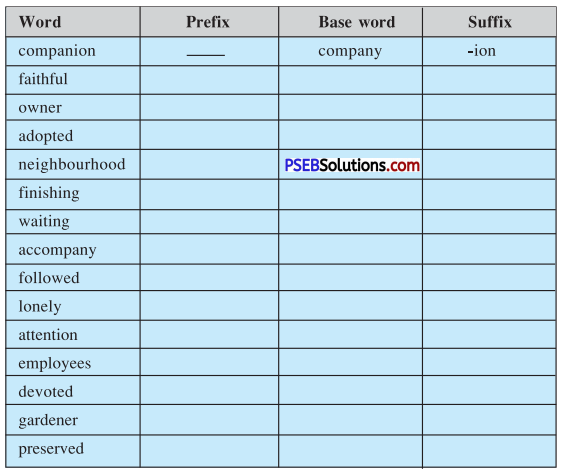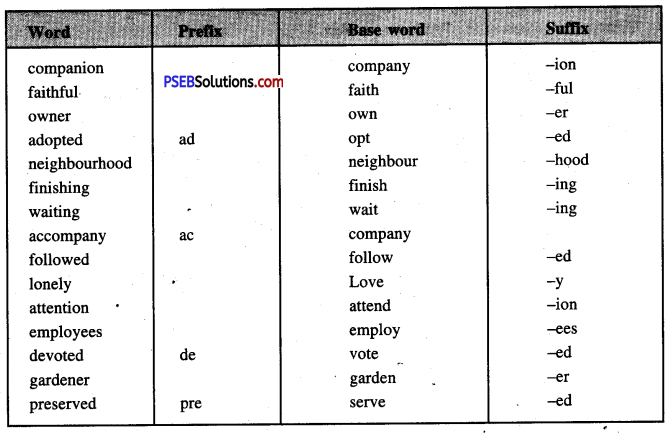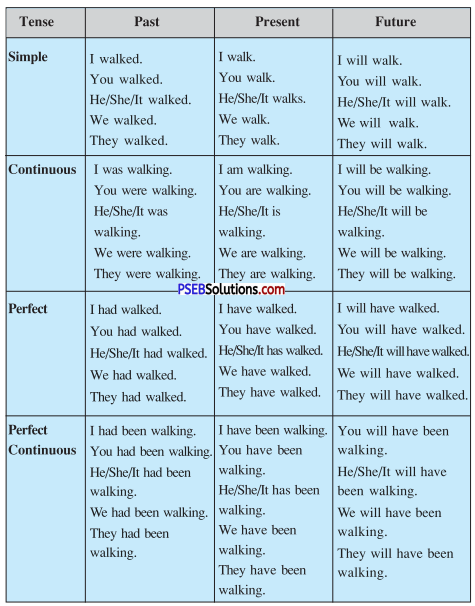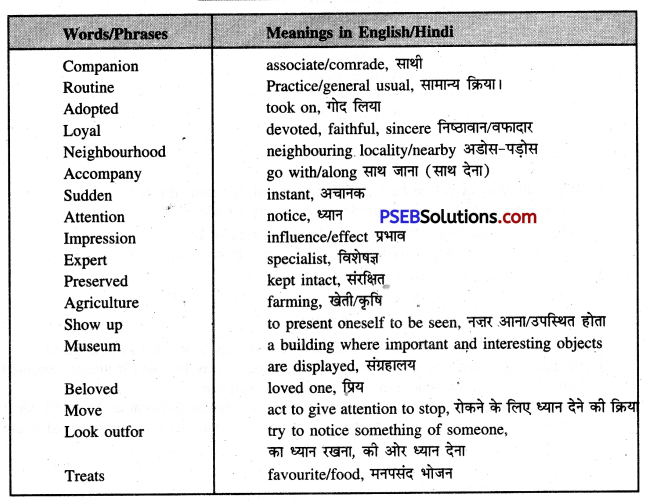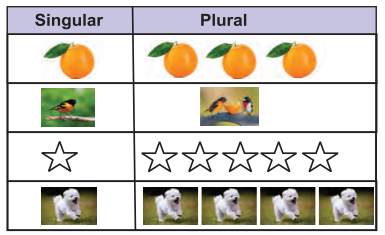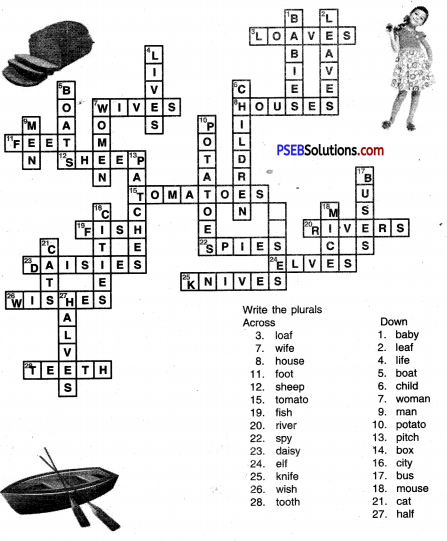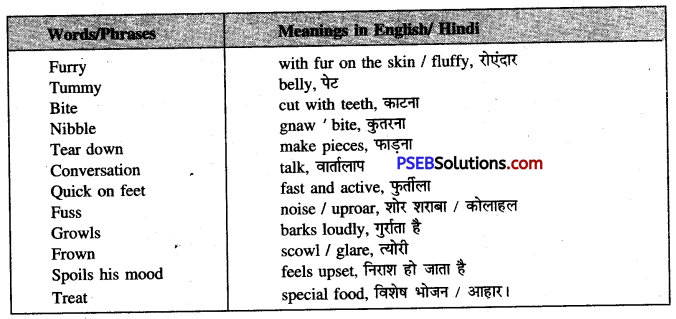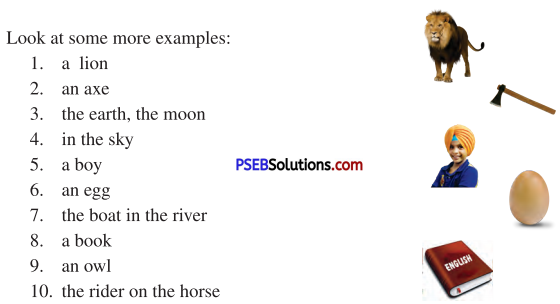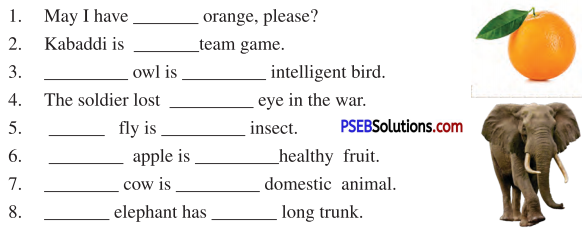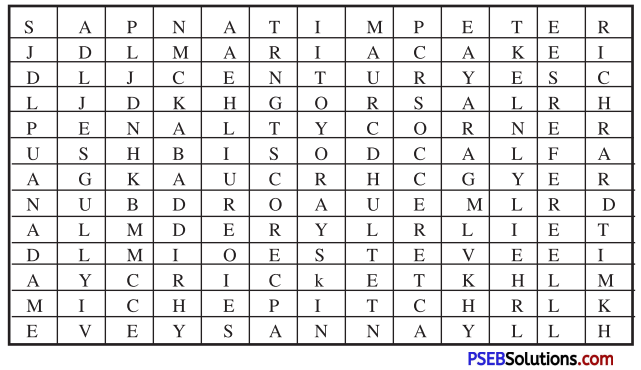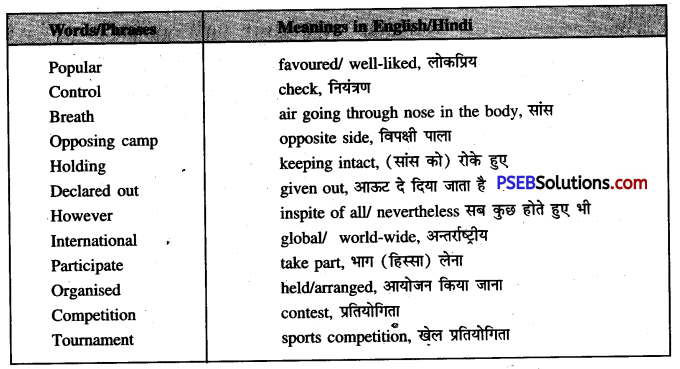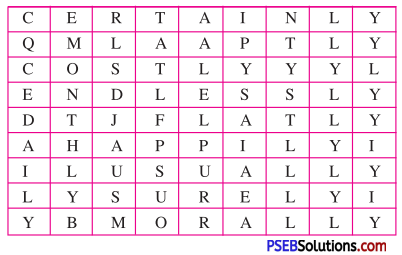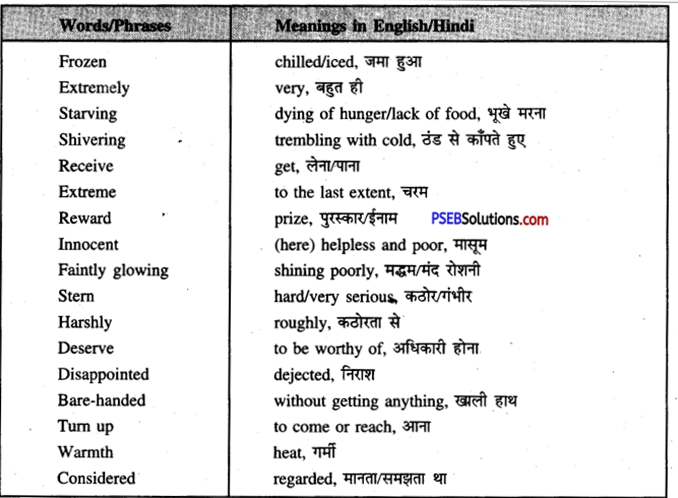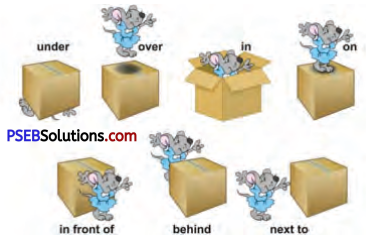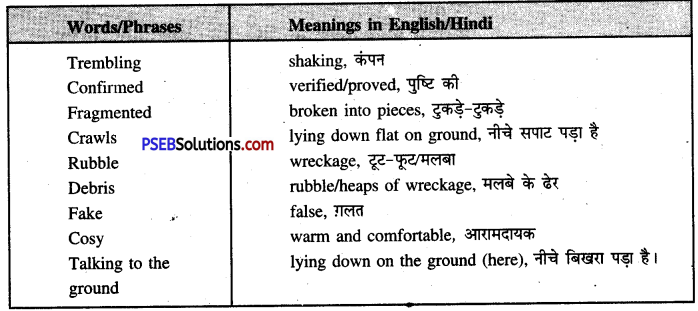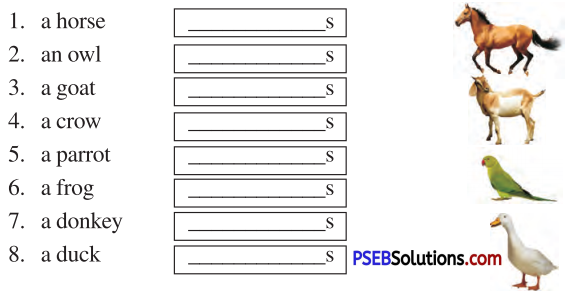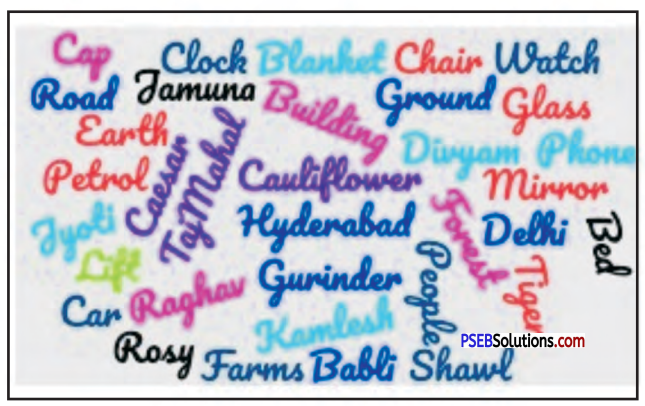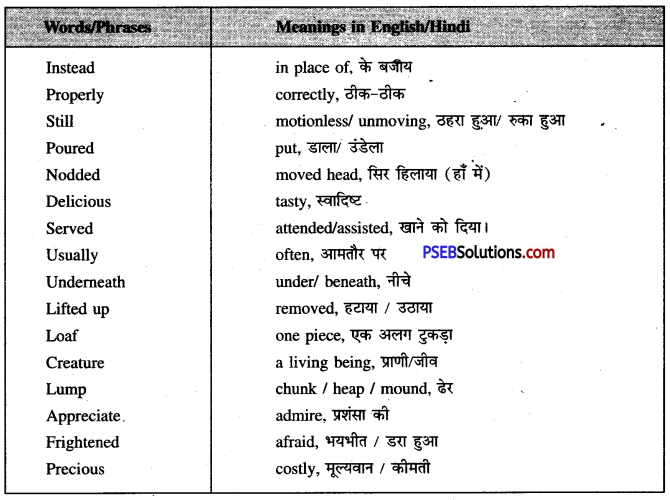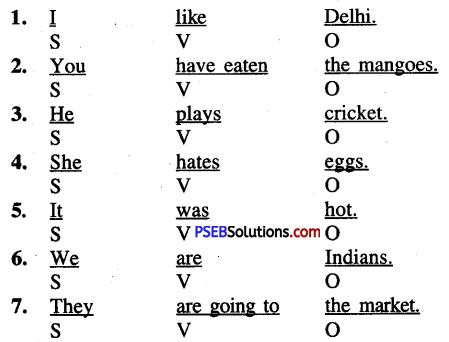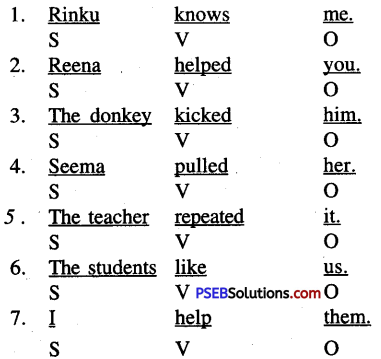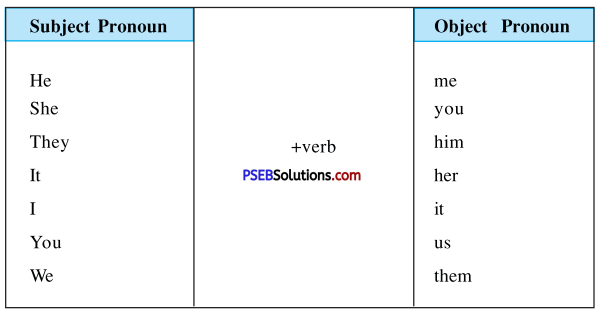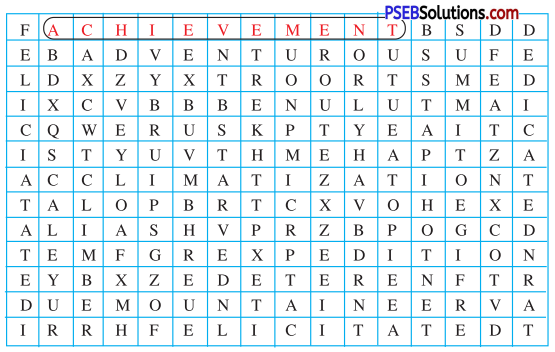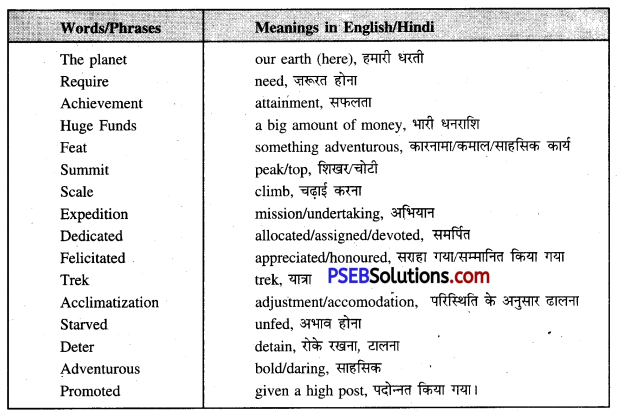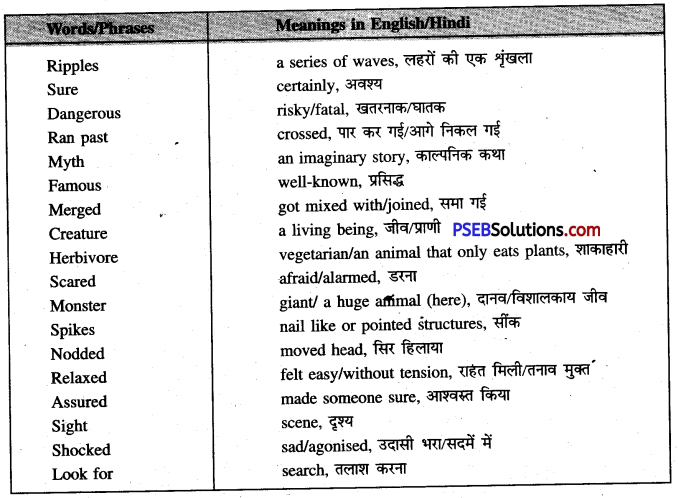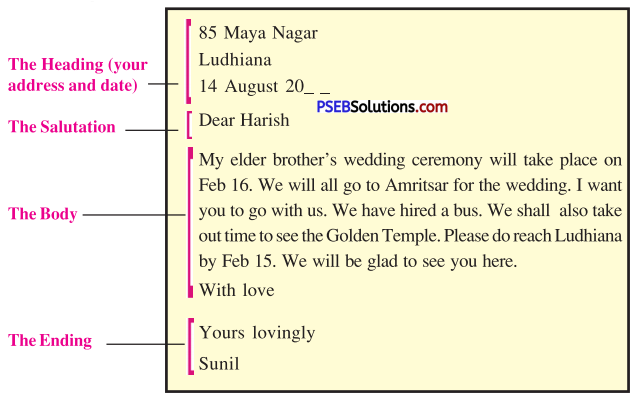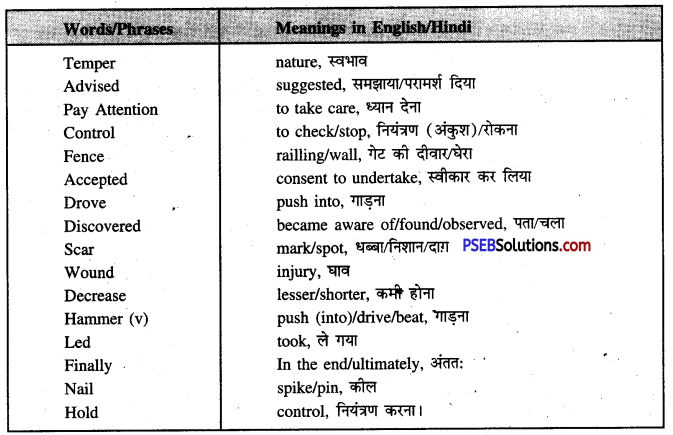Punjab State Board PSEB 7th Class English Book Solutions Chapter 5 The Princess Who Never Smiled Textbook Exercise Questions and Answers.
Class 7th English Solutions Chapter 5 The Princess Who Never Smiled Question Answers
The Princess Who Never Smiled Class 7 Questions and Answers
Activity 1.
Look up the following words in a dictionary. You should seek the following information about the words and put them in your WORDS note work.
1. Meaning of the word as used in the story (adjective/noun/verb, etc.)
2. Pronunciation (The teacher may refer to the dictionary or the mobile phone for correct pronunciation.)
3. Spellings:
| Princess | amuse | tricks | clown | mime |
| Journey | scarce | nervous | appeared | magician |
Activity 2.
Rearrange the jumbled words given in capitals on the right side to mean the following.


![]()
Activity 3.
Answer the following questions :
Question 1.
Why was the king worried about Tanya, the princess ?
राजकुमारी तान्या के बारे में राजा चिंतित क्यों था ?
Answer:
The King was worried because Tanya never smiled.
Question 2.
What did he do to amuse his daughter ?
पुत्री को खुश करने के लिए उसने क्या किया ?
Answer:
He called a magician and a clown to amuse her.
Question 3.
What did the magician do ?
जादूगर ने क्या किया ?
Answer:
The magician showed the princess some tricks.
Question 4.
What did the clown do ?
मस्खरे (जोकर) ने क्या किया ?
Answer:
The clown tried to make the princess laugh with a mime.
Question 5.
What did the king do when the princess did not smile ?
राजकुमारी के न मुस्कराने पर राजा ने क्या किया ?
Answer:
At this, the king declared that anyone who made the princess laugh would get to marry her.
Question 6.
Who was Ivan ?
इवान कौन था ?
Answer:
Ivan was a poor boy who worked for a farmer.
Question 7.
What did Ivan want to do?
इवान क्या करना चाहता था ?
Answer:
Ivan wanted to take a chance to make the princess laugh.
Question 8.
Who all did he meet on his way to the palace ?
महल की ओर जाते हुए वह रास्ते में किस-किस से मिला ?
Answer:
He met a fish, a mouse and a grass-hopper.
Question 9.
What did they want ?
वे क्या चाहते थे ?
Answer:
They wanted to have a new home.
Question 10.
What did Ivan give each of them ?
इवान ने प्रत्येक को क्या दिया ?
Answer:
Ivan gave a gold coin to each of them.
Question 11.
Where was the princess ?
राजकुमारी कहां थी ?
Answer:
The Princess was standing by her window.
Question 12.
What was she doing ?
वह क्या कर रही थी ?
Answer:
She was looking at Ivan.
![]()
Question 13.
What happened when Ivan fell into a hole ?
जब इवान सुराख/बिल में गिरा तो क्या हुआ ?
Answer:
The princess started laughing at this.
Question 14.
Why did she start laughing ?
वह हँसने क्यों लगी ?
Answer:
She started laughing because it was the funniest thing she had ever seen.
Question 15.
What did the king do ?
राजा ने क्या किया ?
Answer:
The king became very happy and started laughing.
Activity 4
Select the correct option and fill it in the given blank :
Question 1.
Princess Tanya was a pretty girl but she did not
(a) smile
(b) walk
(c) speak
Answer:
(a) smile
Question 2.
The king called …….. to amuse her.
(a) a magician
(b) a clown
(c) a magician and a clown
Answer:
(c) a magician and a clown
Question 3.
The farmer gave Ivan three ………. coins.
(a) silver
(b) copper
(c) gold
Answer:
(c) gold
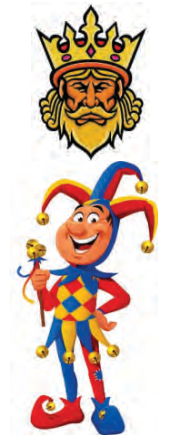
Question 4.
Ivan met a ……….. first of all.
(a) mouse
(b) fish
(c) grass-hopper
Answer:
(b) fish
Question 5.
Ivan gave .. …………. to the mouse.
(a) one coin
(b) two coins
(c) three coins
Answer:
(a) one coin
![]()
Question 6.
The princess was standing by her ………..
(a) window
(b) garden
(c) tower
Answer:
(a) window
Question 7.
Ivan fell into a ………
(a) river
(b) lake
(c) hole
Answer:
(c) hole
Question 8.
The princess laughed on seeing the small animals the fish, the mouse and the grass hopper trying to ………………….. Ivan to save him.
(a) pull up
(b) push down
(c) push away
Answer:
(a) pull up.
Learning Language
Tenses (verb)
हमें क्रिया का समय बताते हैं। यहां Present continuous Tense के बारे में बात की गई है। इस Tense के बारे में जानने के लिए नीचे दिए गए Format का चयन करें
Affirmative
| I | am | laughing (first form of the verb + -ing). |
| He/She/It/Singular Nouns | is | |
| We/You/They/Plural Nouns | are |
Negative.
| I | am not | ||
| He/She/Singular Nouns | is not | watching (verb in its first | a film |
| We/You/They/Plural Nouns | are not | form + ing). |
Interrogative
Is/am/are + subject + first form of the verb + -ing ?
Activity 5
Complete the following sentences using Present Continuous Tense of the verb given in the brackets (Capitalize when needed).
1. My teacher………. talk on the phone right now.
2. …….. you ……………. (dance) ?
3. Cheeku ………………………… (do) his homework at the moment.
4. Shanti …………………………… (work) on a project nowdays.
5. My kids ………………………… (play) in the garden now.
6. Some people ………………. ……… (wait) to talk to you.
7. I ……………… (not go) for a walk today.
8 Leena ……………… (study) for his exam right now ?
9 Uma ……………… (play) the piano now ?
10. Mohan and I ……………… (paint) the fence today.
11. Amita ……………… (help) me at present.
12. My children ……………… (not listen) to the radio now.
13. Saira ……………… (not drink) tea now.
14. I ……………… (vacuum) the carpet right now.
15. My father ……………… (watch) TV now.
16. What she ……………… (eat) right now ?
17. ……. your dog ……… (hide) from me ?
18. Which book ………………………… you ……………….. (read) nowadays?
19. Thomas ………………………. (drive) me home now.
20. I …………………………. (wash) my hands at the moment.
Answer:
1. is talking
2. Are, dancing
3. is doing
4. is working
5. are playing
6. are waiting
7. am not going
8. Is, studying
9. Is, playing
10. are painting.
11. is helping
12. are not listening
13. is not drinking
14. am vacuuming
15. is watching
16. is eating
17. Is, hiding
18. are, reading
19. is driving
20. am washing.
![]()
Now Read the following :
Princess Tanya was watching everything from her window. She started laughing. It was the funniest thing she had ever seen. She laughed and laughed. She kept laughing. The King was passing by her room. He saw that the princess was laughing. The King became very happy. He also started laughing. Within no time, the queen was laughing, the ministers were laughing, the servants were laughing, the guards were laughing and all the people were laughing. Ivan was also laughing.
ऊपर के passage में past (बीते हुए समय की क्रिया, जो उस समय जारी थी) का प्रयोग किया गया है। यह Past Continuous Tense में है। इस Tense के Patterm का अध्ययन नीचे दिए गए वाक्यों में करें।
नोट : Interrogative Sentences में was/were + Subject + first form of the verb + ing ? का Pattern अपनाएं।
Affirmative.
| I/He/She/Singular Nouns | was | watching (verb in its first Torm + -ing). | a film. |
| We/You/They/ Plural Nouns | were |
Negative.
| I/He/She/Singular Nouns | was not | watching (verb in its first form +-ing). | a film. |
| We/You/They/ Plural Nouns | were not |
Activity 6
Supply the suitable forms of verbs given in the brackets. The first one is done for you.
1. I was shopping (shop) when you called.
2. Students …………………………… (play) happily when I reached the class.
3. I told him but he didn’t hear me as he ………………. (watch) the news.
4. Sheela and Khyati ………………………… (work) in the office when the boss walked in.
5. The Knight Riders ……………………… (warm-up) when the Mumbai Indians arrived at the stadium.
6. While Minesh was praying, Kiran ………………………. (bake) a cake.
7. I ……………………. (drive) when you called, so I couldn’t answer.
8. I saw Meena yesterday when she …………….. (walk) by the river.
9. My mother ……………. (cook) and my father …………………………. (dust) the house yesterday.
10. Shanti ……………………….. (boil) milk when Rita came.
Answer:
2. were playing
3. was watching
4. were working
5. were warming up
6. was baking
7. was driving
8. was walking
9. was cooking, was dusting
10. was boiling.
Learning to Listen
Activity 7.
Let us play a game today. Get up from your seats. The name of the game is, “The Princess Says…. You will follow the commands of your teacher. She/he will give you commands to follow. Commands will begin with the phrase “The Princess Says …. If the teacher does not say “The Princess Says…….. before a command (i.e. hold your left ear); you will not follow the command. If you still follow the command, you will be out of the game. The last person left wins.
नोट: अपने teacher के साथ मिलकर स्वयं करें।
Learning to Speak (Pair work)
Activity 8
Imagine that you are talking to your friend on the phone. Tell each other about four things that you and your family members are doing. You can pick words from the following table.
| wash | dance | cook | pray | dust | jump |
| watch | laugh | clean | make | draw | help |
A: Hello, I am ………. X ……… (name) speaking ! Who is on the line ?
B: Hello, I am …….. Y …….. (name) speaking !
A: Oh! What are you doing?
B: I am watching T.V.
A: What is your mother doing ?
B: She is washing clothes. And, what is your mother doing ?
A: She is cooking food.
B: What is your younger brother doing?
A: He is drawing. He is making a dog.
B: What is your elder sister doing? And what about your father?
A: My younger sister is helping mother in the kitchen. My father is praying to God.
B: What is the noise about that is coming ?
A: My younger sister is jumping, dancing and laughing.
B: Good afternoon. Now I am putting the phone down.
![]()
Learning to Write
Activity 9
A mind map of a story is given below. The name of the story is “The Three Pigs’. Using the mind map, write your story about the three pigs and the wolf . All the hints and useful words are given in the mind map.
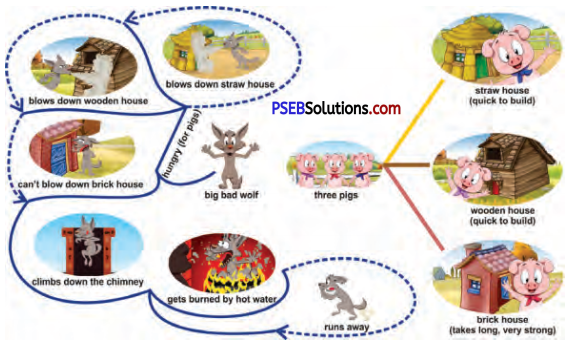
Answer:
The Three Pigs : Once there were three pigs. One lived in a straw house and one in a wooden. Their houses were not strong as they were quickly built. But the third one lived in a brick house that was very strong. One day a big bad wolf came there. It was hungry for pigs. It blew down the straw and the wooden houses easily and ate the pigs. But she could not break down the brick house. Therefore, it climbed down the chimney of the house. Soon she got buried by hot water and ran away crying.
Learning to use language
Activity 10
Read the dialogue between a dinosaur and a sparrow. Dinosaur is an extinct animal and sparrow is about to become extinct. Radiation from mobile phone towers has harmed sparrows and other birds.
Complete the dialogue by taking information from the given table.

| 1. First appeared | 235 million years ago |
| 2. Class | Reptile |
| 3. Size | Different sizes, 20 inches to 39.7 meters |
| 4. Height | 59 feet (largest dinosaurs) |
| 5. Life on Earth | 150 million years |
| 6. Extinction | 66 million years ago |
| 7. Cause of Extinction | Asteroid hit on Earth |
| 8. Result of the asteroid hit | Mass extinction of most species on Earth |
Dialogues
Sparrow : Hello, stranger! You are so huge. How can I help you ?
Dinosaur : Oh, hello! Actually I am not a stranger. I used to live here 66 million years ago.
Humans call us Dinosaurs. So I’m just exploring how much the planet has changed.
Sparrow : Oh, really! How much has it changed ?
Dinosaur : Oh, it has changed so much. I don’t like the change. There were no humans and buildings when I used to live no pollution, no global warming.
Sparrow : Oh, tell me more, Sir !
Dinosaur : There were trees all around. We were everywhere – on land, in the air and in water.
Sparrow : Oh, wow! What were they called ?
Dinosaur : Humans have named the flying Dinosaurs as PTERODACTYL.
Sparrow And what about the ones that lived in the water ?
Dinosaur : They have been named as SPINOSAURUS.
Sparrow : Mr Dinosaur, I have so many questions to ask you.
Dinosaur : Don’t worry, I know what is in your mind.
Here I am going to tell you all about me and our family.

We were reptiles. We appeared on earth 235 million years ago. We were of different sizes — from 20 inches to 39.7 meters. The largest member of our family was 59 feet tall. We lived about 150 million years on earth. But about 66 million years ago an asteroid hit the earth that caused our extinction. This incident also led to the extinction of most species of this planet.
![]()
Comprehension Of Passages
Read the following passage carefully and answer the questions that follow each.
(1) This is a very old story from Russia. There was a princess in Russia. Her name was Tanya. Tanya was very beautiful but she never smiled or laughed. Her father, the king, loved her very much but he kept worrying because she never smiled. Even the queen was worried.
King (said to himself): I must find a way to make my daughter happy. I want to see her smiling! And he had an idea. He called a magician to amuse his daughter. The magician showed the princess some tricks.
1. What kind of girl was Tanya ?
तान्या कैसी लड़की थी ?
2. What did Tanya’s father wish ?
तान्या के पिता की क्या इच्छा थी ?
3. Choose true and false statements and write them in your note-book.
(a) Tanya’s father was a king.
(b) Queen never got worried.
4. Complete the sentences according to the meaning of the passage.
(a) Tanya was a …………..
(b) The magician showed the princess …………..
5. Match the words with their meanings.
| (a) worried | entertain |
| (b) amuse | anxious |
| show |
Answer:
1. Tanya was very beautiful but she never smiled or laughed.
2. Tanya’s father wished to see his daughter (Tanya) smiling.
3.
(a) True
(b) False
4.
(a) Tanya was a princess in Russia.
(b) The magician showed the princess some tricks.
5.
(a) worried — anxious
(b) amuse — entertain
![]()
(2) Very far from the palace, there lived a poor boy. His name was Ivan. He worked for a farmer. When he heard about the king’s promise, he wanted to take a chance at making the princess laugh. He thought that he could make her laugh. The farmer gave the boy three gold coins for the journey.
On his way, he found a lake. In the lake, there was a fish. The fish called him.
Fish (to Ivan) : Oh ! Can you help me, please ?
Ivan (to the fish) : How can I help you, fish ?
Fish (to Ivan) : I have lived in this lake for a long time.
Now the water is getting dirty. I don’t want to live here anymore, but I am too poor to find a new house.
Ivan (to the fish): I am so sorry, Fish. I have three gold coins. I can give you one. I’ll still have two for my journey. I am going to meet the princess.
1. Who was Ivan ? Where did he live ?
इवान कौन था ? वह कहां रहता था ?
2. What did Ivan saw on his way?
रास्ते में उसे क्या दिखाई दिया ?
3. Choose true and false statements and write them in your note-book.
(a) The fish had lived in the lake for a long time.
(b) The fish wanted the princess to help it.
4. Complete the sentences according to the meaning of the passage.
(a) The farmer gave the boy ………….. for the journey.
(b) I am too poor to
5. Match the words with their meanings.
| promise | saw |
| found | made |
| word |
Answers
1. Ivan was a poor boy who worked for a farmer. He lived very far from the king’s palace.
2. On his way, Ivan saw a lake with a fish in it.
3.
(a) True
(b) False
4.
(a) The farmer gave the boy three gold coins for the journey.
(b) I am too poor to find a new house.
5.
(a) promise — word
(b) found — saw.
![]()
(3) Ivan continued travelling. He was hungry and very tired. He had no money to buy food. He reached the palace. He saw the princess. She was standing by her window. She was looking at him. He became nervous because the princess was looking at him. He fell into a hole.
Ivan (shouting) : Help! Someone, help me!
Suddenly, the fish, the mouse and the grass-hopper appeared.
All three (fish, mouse and grasshopper) : Don’t worry! We will save you !
The three of them pulled the boy from the hole.
1. In what condition was Ivan when he reached the palace ?
महल तक पहुँचने पर इवान की क्या दशा थी ?
2. Why did he become nervous ?
वह घबरा क्यों गया ?
3. Choose true and false statements and write them in your note-book.
(a) The princess was standing.
(b) The three of them pulled the boy.
4. Complete the sentences according to the meaning of the passage.
(a) The princess was standing …………………..
(b) The three of them pulled the boy …………..
5. Match the words with their meanings.
| (a) nervous | confused |
| (b) appeared | became invisible |
| became visible |
Answer:
1. Ivan was very hungry and thirsty when he reached the palace.
2. He became nervous because the princess was looking at him.
3.
(a) False
(b) True
4.
(a) The princess was standing by her window.
(b) The three of them pulled the boy out from the hole.
5.
(a) nervous — confused
(b) appeared — became visible
![]()
(4) Princess Tanya was watching everything from her window. She started laughing. It was the funniest thing she had ever seen. She laughed and laughed. She kept laughing. The king was passing by her room. He saw that the princess was laughing. The king became very happy. He also started laughing. Within no time, the queen was laughing, the ministers were laughing, the servants were laughing, the guards were laughing and all the people were laughing. Ivan was also laughing. The king kept his promise. The kingdom came to know that Ivan and the princess were getting married. They got married. Ivan became a prince. He went to the king.
1. How did the King feel ?
राजा ने कैसा महससू किया ?
2. Who were getting married ?
किसकी शादी हो रही थी ?
3. Choose true and false statements and write them in your note-book.
(a) The king did not keep his promise.
(b) Ivan became a prince.
4. Complete the sentences according to the meaning of the passage.
(a) Within …………….. the queen was laughing.
(b) The king saw that ………….
5. Match the words with their meanings.
| (a) funniest | smile |
| (b) watch | most amusing |
| see |
Answer:
1. The king became very happy.
2. The princess and Ivan were getting married.
3.
(a) False
(b) True
4.
(a) Within no time the queen was laughing.
(b) The king saw that the princess was laughing.
5.
(a) funniest — most amusing
(b) watch — see
Use Of Words/Phrases In Sentences
1. Amuse (entertain) –
Mother amused her child with toys.
माँ ने खिलौनों से अपने बच्चे का मनोरंजन किया।
2. Tricks. (feats) –
The tricks of the magician were funny.
जादूगर के करतब मज़ाकिया थे।
3. Nervous (confused) –
Why are you so nervous ?
आप इतने घबराए हुए क्यों हैं ?
4. Scarce (not enough, scanty) –
Water is getting scarce here.
यहां पानी की कमी होती जा रही है।
![]()
5. Worried (anxious) –
You look worried. What is the problem ?
तुम चिंतित दिखाई देते हो। क्या समस्या है ?
6. Journey (trip) –
We went on a long journey last year.
पिछले साल हम एक लंबी यात्रा पर गए।
7. Princess (royal maiden) –
The princess was married to a handsome prince.
राजकुमारी की शादी एक सुंदर राजकुमार से कर दी गई।
8. Appeared (came in front of) –
The thief appeared before the judge.
चोर जज के सामने आया।
9. Pulled (dragged) –
We pulled the heavy fish with a rope.
हमने भारी मछली को एक रस्सी से खींचा।
Word Meanings
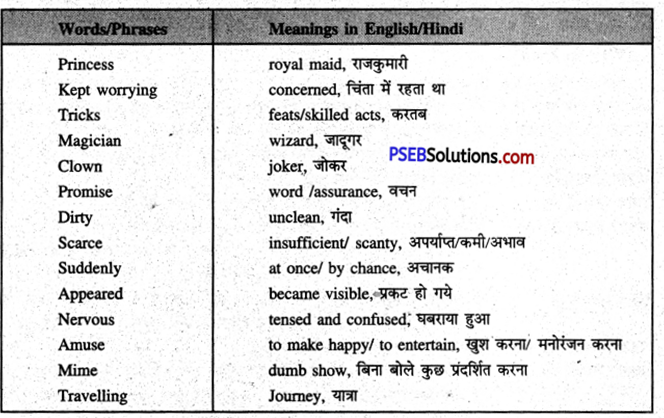
The Princess Who Never Smiled Summary in Hindi
This is very old …………………….. them could do it.
यह रूस की एक बहुत पुरानी कहानी है। रूस में एक राजकुमारी थी। उसका नाम तान्या था। तान्या बहुत सुंदर थी लेकिन वह कभी भी हंसती या मुस्कराती नहीं थी। उसके पिता राजा थे और उसे बहुत प्यार करते थे परन्तु वह चिंतित रहते थे क्योंकि वह कभी मुस्कराती नहीं थी। यहां तक कि रानी भी चिंतित थी। राजा (अपने आप से कहा) : मुझे कोई रास्ता ढूंढना चाहिए ताकि मैं अपनी बेटी को खुश कर सकू। मैं उसे मुस्कराते हुए देखना चाहता हूँ। और उसे एक विचार सूझा। उसने अपनी बेटी को बहलाने के लिए एक जादूगर को बुलाया। जादूगर ने राजकुमारी को कुछ कतरब दिखाए। राजा
(राजकुमारी से) : हा, हा, हा …… क्या यह मनोरंजक नहीं ?
राजकुमारी (राजा से) : हाँ, पिता जी। करतब अच्छे हैं परन्तु वे मेरे चेहरे पर मुस्कान नहीं ला सकते।
उन्होंने एक जोकर को भी बुलाया ताकि वह मुस्करा सके।
राजा (राजकुमारी से) : हा, हा, हा …… क्या यह मज़ेदार नहीं ?
राजकुमारी (राजा से) : हाँ पिता जी। जोकर मजाकिया है, परन्तु वह मुझे मुस्कराहट नहीं दे सकता।जोकर उसे हंसाने के लिए नकलें भी उतारता है।
राजा (राजकुमारी से) : हा, हा, हा ………. क्या यह मज़ाकिया नहीं है ?
राजकुमारी (राजा से) : वह अच्छा है परन्तु वह मेरी मुस्कराहट नहीं ला सकता।
अन्ततः उसने अपने देश के सभी लोगों को यह बताने का निर्णय लिया कि जो कोई भी राजकुमारी को हँसा देगा, उसका विवाह राजकुमारी से कर दिया जाएगा। रूस भर से लोग राजा के महल गए और उन्होंने राजकुमारी को हँसाने का प्रयत्न किया, परन्तु कोई भी ऐसा न कर सका।
Very far from ………………. meet the princess.
महल से बहुत दूर एक गरीब लड़का रहता था। उसका नाम इवान था। वह एक किसान के पास काम करता था। जब उसने राजा के वचन के बारे में सुना, तो उसने राजकुमारी को हँसाने का एक अवसर पाने की सोची। वह सोचता था वह उसे हँसा सकता है। किसान ने यात्रा के लिए लड़के को तीन स्वर्ण मुद्राएं दीं। रास्ते में उसे एक झील मिली। झील में एक मछली थी। मछली ने उसे पुकारा। मछली (इवान से) : ओह! कृपया आप मेरी मदद कर सकते हैं ?
इवान (मछली से) : मछली, मैं तुम्हारी क्या मदद कर सकता हूँ ?
मछली (इवान से) : मैं एक लम्बे समय से इस झील में रह रही हूँ। अब पानी गंदा हो रहा है। मैं यहाँ और
अधिक नहीं रहना चाहती, परंतु मैं इतनी गरीब हूँ कि अपने लिए नया घर नहीं ले
सकती। इवान (मछली से) : मछली, मैं माफी चाहता हूँ। मेरे पास तीन स्वर्ण मुद्राएं हैं। मैं एक तुम्हें दे सकता हूँ।
मेरे पास यात्रा के लिए फिर भी दो बच जाएंगी। मैं राजकुमारी से मिलने जा रहा हूँ।
मछली (इवान से) : मैं तुम्हारा धन्यवाद कैसे कर सकती हूँ ?
इवान (मछली से) : चिंता मत करो। मुझे तुम्हारी मदद करके खुशी हुई। मुझे आशा है कि तुम्हें एक नया और अच्छा घर मिल जाएगा। इवान ने अपनी यात्रा जारी रखी। उसने एक बड़ा सा खेत
देखा। खेत में एक चूहा था। चूहे ने उसे पुकारा। चूहा (इवान से) हैलो नवयुवक! क्या तुम मेरी सहायता कर सकते हो ?
इवान (चूहे से) : चूहे, मैं तुम्हारी मदद कैसे कर सकता हूँ?
चूहा (इवान से) : मैं लम्बे समय से इस खेत में रह रहा हूँ। अब यहां भोजन कम होता जा रहा है। मैं अब यहां और अधिक नहीं रहना चाहता, परन्तु मैं गरीब हूँ।
इवान (चूहे से) : चूहे, मैं माफी चाहता हूँ। मेरे पास दो स्वर्ण मुद्राएं हैं। मैं एक तुम्हें दे सकता हूँ। मेरे
पास यात्रा के लिए फिर भी एक रह जाएगी। मैं राजकुमारी से मिलने जा रहा हूँ।
चूहा (इवान से) : तुम बहुत दयालु हो। मैं किस प्रकार तुम्हारा आभार व्यक्त करूं?
इवान : चिंता मत करो। मैं तुम्हारी मदद करके खुश हूँ। मुझे आशा है कि तुम्हें एक अच्छा और नया घर मिल जाएगा।
Ivan continued ………………….. from the hole.
इवान ने यात्रा जारी रखी। वह एक जंगल में पहुंचा। जंगल में एक टिड्डा रहता था। टिड्डे ने उसे पुकारा।
टिड्डा (इवान से) : सुनिये! क्या तुम मेरी मदद कर सकते हो ?
इवान (टिड्डे से) : टिड्डे, मैं तुम्हारी क्या मदद कर सकता हूँ ?
टिड्डा (इवान से) : मैं लम्बे समय से इस जंगल में रह रहा हूँ। अब बहुत अधिक गर्मी होती जा रही है। मैं अब यहां नहीं रहना चाहता, परन्तु मैं गरीब हूँ।
इवान (टिड्डे से) : टिड्डे, मैं माफी चाहता हूँ। मेरे पास एक स्वर्ण मुद्रा है। मैं वह तुम्हें दे सकता हूँ। मैं अपना काम चला लूंगा। मैं राजकुमारी से मिलने जा रहा हूँ।
टिड्डा (इवान से) : तुम बहुत दयालु हो। मैं तुम्हारा आभार किस प्रकार व्यक्त करूं।
इवान (टिड्डे से) : चिंता मत करो। मैं तुम्हारी मदद करके खुश हूँ। मैं आशा करता हूँ कि तुम्हें एक अच्छा
और नया घर मिल जायेगा। इवान ने यात्रा जारी रखी। वह भूखा और बहुत थक चुका था। उसके पास भोजन के लिए पैसे नहीं थे। वह महल पहुंच गया। उसने राजकुमारी को देखा। वह अपनी खिड़की में खड़ी थी। वह उसे देख रही थी। वह घबरा गया क्योंकि राजकुमारी उसकी ओर ही देख रही थी। वह एक सुराख में जा गिरा।
इवान (चिल्लाया) : सहायता! कोई मेरी सहायता करो। अचानक ही मछली, चूहा तथा टिड्डा प्रकट हो गए।
तीनों मिलकर (मछली, : चिन्ता मत करो। हम तुम्हारी रक्षा करेंगे। चूहा तथा टिड्डा), तीनों ने मिलकर उसे सुराख से बाहर खींच लिया।
![]()
Princess Tanya ………….. People were smiling.
राजकुमारी तान्या यह सब कुछ अपनी खिड़की से देख रही थी। वह हँसने लगी। यह उसके लिए सबसे मनोरंजक बात थी, जो कुछ भी उसने अब तक देखा था। वह जोर से हँसने लगी और वह लगातार हँसती रही। राजा उसके कमरे के पास से गुजर रहा था। उसने देखा कि राजकुमारी हँस रही है। राजा बहुत खुश हुआ। वह भी हँसने लगा। तुरंत ही रानी हँसने लगी, मंत्री हँसने लगे, नौकर हँसने लगे, सुरक्षाकर्मी हँसने लगे और सभी लोग हँसने लगे। इवान भी हँसने लगा।
राजा ने अपना वचन निभाया। राज्य को पता चल गया कि इवान और राजकुमारी की शादी हो रही है। उनकी शादी हो गई। इवान राजकुमार बन गया। वह राजा के पास गया।
इवान (राजा से) : मुझे मेरे मित्र बहुत प्रिय हैं। मैं उन्हें महल में रख रहा हूँ।
राजा (इवान से) : मुझे कोई परेशानी नहीं है। उन्होंने भी राजकुमारी को हँसाया है।
उस दिन से महल एक खुशी भरा स्थान बन गया। चारों ओर हँसी और मुस्कराहटें बिखरी हुई थीं। इवान, राजकुमारी तान्या और उसके मित्र मुस्करा रहे थे, राजा मुस्करा रहा था, रानी मुस्करा रही थी, मंत्री मुस्करा रहे थे, नौकर मुस्करा रहे थे, सुरक्षाकर्मी मुस्करा रहे थे और सभी लोग मुस्करा रहे थे।
Retranslation Of Isolated Sentences
1. There was a princess in Russia. — रूस में एक राजकुमारी थी।
2. Her father, the king loved her very much. — उसके पिता, राजा उसे बहुत प्यार करते थे।
3. Even the queen was worried. — यहां तक कि रानी भी चिंतित थी।
4. I want to see her smiling. — मैं उसे मुस्कराते हुए देखना चाहता हूं।
5. The magician showed the princess some tricks. — जादूगर ने राजकुमारी को कुछ करतब दिखाए।
6. He called a clown to make her smile.– उसने उसकी मुस्कराहट लाने के लिए एक जोकर (मस्खरे) को बुलाया।
7. He is good, but he does not make me smile.– यह अच्छा है, परन्तु यह मुझे मुस्कराहट प्रदान नहीं कर सकता।
8. People from all over the Russia went to the king’s palace. — रूस भर से लोग राजा के महल में गए।
9. He worked for a farmer. — वह किसान के पास काम करता था।
10. The farmer gave the boy three gold coins for the journey. — किसान ने यात्रा के लिए लड़के को तीन मुद्राएं दीं।
11. The king kept his promise. — राजा ने अपना वचन निभाया।
12. She kept laughing. — वह लगातार हँसती रही।
13. I am happy to help you. — मुझे तुम्हारी मदद करके खुशी हुई।
14. He was hungry and very tired. — वह भूखा था और बहुत थका हुआ था।
15. He fell into a hole. — वह एक सुराख में गिर गया।
16. Three of them pulled the boy from the hole. — तीनों ने मिलकर उसे सुराख से खींच लिया।
17. Princess Tanya was watching everything from her window. — राजकुमारी तान्या यह सब कुछ अपनी खिड़की से देख रही थी।
English Guide for Class 7 PSEB Prose

